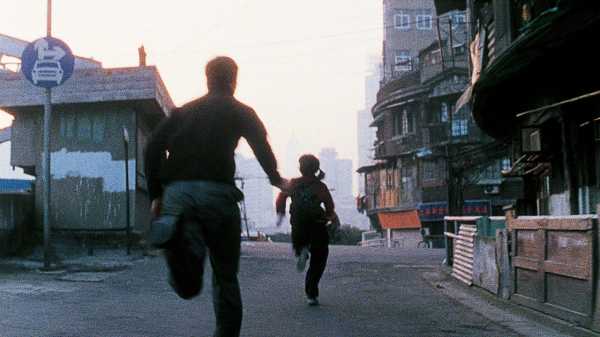
There are enough genres mashed up in Lou Ye’s 2000 film “Suzhou River” to fill a festival, and its complexity is far more than a display of the director’s virtuosity. Cinematic form has a special meaning for filmmakers working under censorship, and Lou, a Chinese filmmaker, did (and still does) as many other filmmakers (such as the Iranian director Jafar Panahi) do under similar circumstances. Lou constructs an intricate narrative to remind viewers of his need to take roundabout measures to suggest what’s on his mind; by calling attention to brazen artifices, he emphasizes the obstacles to his depiction of reality. The puzzle-like complexity of “Suzhou River” (which is playing at Film Forum, in a new restoration) warns viewers to watch the film strategically, not to take it at face value, to be wary of what they’re seeing even as his enticing tale draws them in.
In “Suzhou River,” Lou—a filmmaker of meticulous craft and a powerful sense of symbolism—builds his protagonist’s story around the character’s own storytelling, devising multiple layers of action, from documentary-like exploration to faux-archival video clips to the depiction of fantasy-like fiction that then links up with the protagonist’s daily life. That’s why, in a way, just describing “Suzhou River” is a form of critical thought, because its twists and turns are so abrupt, its dramatic structure so elusive, that it requires a sort of roadmap to highlight its ironies and allusions, the realities implied by its calculated evasions.
For starters, “Suzhou River” is placed under the sign of trailblazing modernism: it’s a diary-film, not an actual diary but a composed work of first-person cinema, in which the central character and central consciousness is fictional—maybe. Despite dominating the film with his point of view and his voice-over narration, the protagonist remains a cagey and calculated mystery—he’s never named, and his face is never even seen, though his hands pop into the frame a few times, for a few moments. What’s more, Lou doubles down on the modernistic premise by making “Suzhou River” cinema-centric: that unnamed protagonist (voiced by Zhang Ming Fang, who’s uncredited) is a filmmaker of sorts, a freelance videographer living and working on the teeming, louche quasi-underworld of the Shanghai waterfront, beside the titular river.
The protagonist—I’ll call him the Videographer—lends the movie a documentary-like tone, with its scenes, seemingly those that he himself has filmed, of the daily lives on the waterfront of hangers-on like himself who scrounge and scuffle in the city’s margins. One regular client, a sleazy manager of a sleazy night club, hires him to videotape the performance a young woman named Meimei (Zhou Xun), a swim-dancer who does a show in the bar as a mermaid in an aquarium-like glass-walled tank. After the show, she and the Videographer meet; they start a romantic relationship, but she, too, is a person of mystery, vanishing for days at a time. During one of their reunions, Meimei flings a romantic insult at the Videographer, doubting that, if she disappeared, he’d be as devoted as a young man of urban legend named Mardar—a bike messenger who, when the woman he loved disappeared, spent his life looking for her.
At that point, the Videographer becomes a sort of cinematic Scheherazade, making up Mardar’s story, which is dramatized as the Videographer himself, in voice-over, narrates and comments on it. The tale of Mardar (Jia Hongsheng) is a blend of film noir and supernatural fantasy, a downbeat story of a young man who’s at loose ends; he buys a stolen motorcycle and has big dreams, but ends up one of the city’s horde of bike messengers. A sleazy night-club operator hires Mardar to ferry a young woman named Moudan (who’s also played by Zhou Xun) back and forth between the homes of her dissolute father and her aunt—and, in the course of these journeys, the two fall in love. The relationship of Mardar and Moudan turns out to be a complex gangster tragedy—complete with kidnapping, firearms, attempted suicide, police violence, murder, incarceration, and dire secrets of a criminal and sexual past. It’s told with flashbacks and a jolting shift in dramatic perspective, it features a phantasmagorical twist of mythological reincarnation, and—exactly as Meimei told the Videographer—it involves Moudan’s disappearance and Mardar’s relentless search for her.
Yet Lou has still more narrative tricks up his sleeve, and there’s no discussing the film without revealing the juiciest of them. In a variation on Hitchcock’s “Vertigo,” Mardar, in the course of his search for the vanished Moudan, encounters Meimei and believes that she is actually his lost lover. Then, Lou adds yet another twist, transforming “Suzhou River” into a bewitching cinematic Möbius strip: Mardar, through his acquaintance with Meimei, meets the Videographer, whose real life becomes intertwined with the life of the fictionalized character of his imaginings. Fear no spoilers: the movie goes even further with its intermingling of myth and reality, fact and fiction. Its radical indeterminacy, its abyss of unstable identities and unresolved mysteries, is at the heart of Lou’s bold political diagnostics.
The Rube Goldberg-esque dramatic framework delivers documentary-like depictions of a grimy and colorless Shanghai that’s disconnected from the shining high-rise capital of commerce, untouched by rapid technological development, filled with shadowy wanderers isolated from the official social order of work units and Party management. The depiction in “Suzhou River” of unemployment and idleness and drunkenness, of gangland crime and police corruption, of covert maneuvering outside the ambit of Party propaganda and patriotic pomp, is bold in itself. Its boldness, deflected in its intricacy, nonetheless all the more significantly depends on a narrator, the Videographer, who’s in hiding—a storyteller who, in telling such a story, doesn’t dare disclose his face or his name.
Lou’s career is centered on such a blend of defiant depictions and elaborate ruses, and he has endured official censure as a result. His tale of a storyteller in hiding was prophetic: “Suzhou River” was banned in China, and Lou was punished for showing it in the Rotterdam film festival in 2000 with a two-year ban on filmmaking. In the 2006 film “Summer Palace,” he was, apparently, the first Chinese filmmaker to dramatize the sanguinary repression of student protest in Tiananmen Square, in 1989—and he went even further, with an allusive critique of Westerner intellectuals’ facile embrace of the same Communist ideology that’s embodied in the massacre. Not only was the film banned but Lou was banned from making films for five years, ostensibly for showing it in the Cannes Film Festival without government authorization. Lou’s 2019 film “Saturday Fiction” tells a dazzlingly complicated historical story of the Second World War—one that’s centered on a theatre troupe confronting the repressive violence of the Japanese occupation of Shanghai—to allegorize the paranoiac ambiance of surveillance and infiltration in China’s current-day cultural scene. It, too, was subjected to censorship in China, though it was ultimately released there, in 2021.
The proliferation of genres in “Suzhou River” reflects back on the bowdlerized media world from which the film borrows—and on the inner lives of people whose emotions are conditioned by it. When the fairy-tale romance, complete with mermaids, bursts into real life, it, too, turns into absurd tragedy. Lou exposes the bitter realities that are commemorated and sweetened in the soap-operatic tales of love, loss, and yearning, of the sort that get framed as urban legend, get sung as the sentimental pop ballads that fill the movie’s soundtrack, and get filmed in “Suzhou River” itself. In effect, Lou, by turning hypotheticals into certitudes and myths into realities, is provoking viewers to bypass the positive news that is the stuff of official media and the positive images of life that underpin personal optimism. Think, the film suggests, of the worst interpretation of what’s happening—imagine the ugliest motives and cruelest contexts for the stories that you hear and read, and know that they’re likely to hit the mark. ♦
Sourse: newyorker.com






